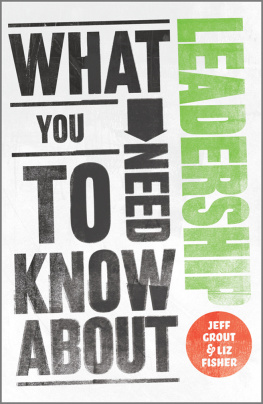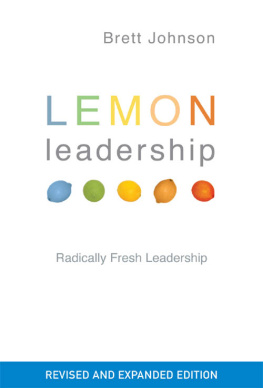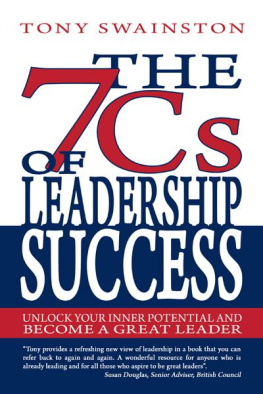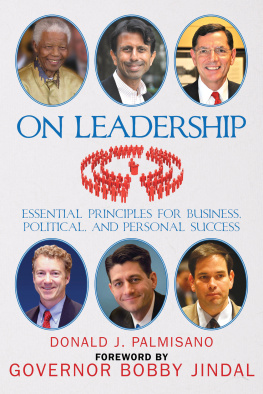PICK UP
Your Own
BRASS
RELATED POTOMAC TITLES
Bullets, Bombs, and Fast Talk: Twenty-five Years of FBI War Stories
James Botting
On-Scene Commander: From Street Agent to Deputy Director of the FBI
Weldon L. Kennedy
Ruse: Undercover with FBI Counterintelligence
Robert Eringer
PICK UP
Your Own
BRASS
LEADERSHIP
THE FBI WAY
KATHLEEN MCCHESNEY
& WILLIAM GAVIN
FOREWORD BY TOM PETERS

Copyright 2011 by Potomac Books, Inc.
Published in the United States by Potomac Books, Inc. All rights reserved. No part of this book may be reproduced in any manner whatsoever without written permission from the publisher, except in the case of brief quotations embodied in critical articles and reviews.
Library of Congress Cataloging-in-Publication Data
McChesney, Kathleen, 1950
Pick up your own brass : leadership the FBI way / Kathleen McChesney and William Gavin. 1st ed.
p. cm.
ISBN 978-1-59797-683-1 (pbk.)
1. Leadership. I. Gavin, William. II. Title.
HD57.7.M39525 2011
658.4092dc22
2011004710
Printed in the United States of America on acid-free paper that meets the American National Standards Institute Z39-48 Standard.
Potomac Books
22841 Quicksilver Drive
Dulles, Virginia 20166
First Edition
10 9 8 7 6 5 4 3 2 1
CONTENTS
FOREWORD
Its been my secretuntil now: writing forewords is all about ego. Mine. Of the literally hundreds of requests Ive had, Ive written no more than a half-dozen forewords. And each of those has been for a book that I considered to be of surpassing importance. Hence, I get to have the first word for something of remarkable valuewhich, in turn, makes me look good with the least bit of work.
First of all, what right have I got to be writing this? Im a private sector guy, or so it seems. To begin with, Ive put in (with pleasure) my public sector timefour-plus years in the Navy (Seabees in Vietnam, then the Pentagon) and two years more or less in the White House (staff director of the Cabinet Committee on International Narcotics Control). Second, there are universals. I get to go out in public because of a book I cowrote in 1982, In Search of Excellence. My coauthor, Bob Waterman, and I did indeed examine private sector companies, but our findings apply anywhere. The excellent companies were highly profitable, but the profit per se was not the goal. The profit was a derivative concept. That is, the profit came not from a love of money but from doing the right things right and being of service. While the book weighed in at over three hundred pages, I believe it can be summarized in four words: People, Customers, Action, Values.
That is:
 It all100 percentstems from remarkable people who are remarkably developed and remarkably led by true, ego-free servant leaders.
It all100 percentstems from remarkable people who are remarkably developed and remarkably led by true, ego-free servant leaders.
 We are all (FBI or McDonalds or Boeing) 100 percent in the business of providing extraordinary service to our clients (citizens or customers) 100 percent of the time.
We are all (FBI or McDonalds or Boeing) 100 percent in the business of providing extraordinary service to our clients (citizens or customers) 100 percent of the time.
 While thoughtfulness is imperative, nothing happens without an ingrainedsome might say fanatic100 percent bias for action. (A Bias for Action was the first of our eight basic principles.)
While thoughtfulness is imperative, nothing happens without an ingrainedsome might say fanatic100 percent bias for action. (A Bias for Action was the first of our eight basic principles.)
 You are as good as your devotion to your core values. Let vigorous adherence to them slip to less than 100 percent and you lose the support of your constituents and members alike.
You are as good as your devotion to your core values. Let vigorous adherence to them slip to less than 100 percent and you lose the support of your constituents and members alike.
Each of these four governing ideas from In Search of Excellence is practiced within and could have been invented by the FBI. And these four ideas animate, with a clear passion, this book as well as my own.
You can (or should) fall in love with this book with no more than a glance at the chapter titles. They give away the plot. Here are a few that captured me in a flash: Find the Best Talent; Leadership: A Privilege, Not a Right; Know Your People; Everyone Is the Face of Your Organization; We Can Do This!; The Action Imperative; Its Not About Me; Help! I Need Somebody; The Boss Is Not Always Right; Defend Your Team; Grandstands Are for the Circus; Saying Thanks; Not Everyone Is Going to Like You; Leaders of Leaders.
With the rest they add up tofrom alpha to omegathe right stuff of inspired and effective leadership practice.
The book is extracted from the extraordinary experiences of extraordinary senior leaders, Kathleen McChesney and Bill Gavin, in an institution the great majority of us admire. Maybe some of us, the older among us at least, see the image of J. Edgar Hoover and a tommy gun when we think of the FBI, but for those of us who have had experience with the organization (Ive had that experience, albeit only fleeting), the phrase that comes to mind is thoroughly professional. There are, to be sure, high-publicity cases, but the real story is the hard, meticulous, overwhelmingly unglamorous, day-to-day work performed by thousands of committed agents and support staff members and a remarkable cadre of leaders who deliver the goods for three hundred million American citizen clients year in and year out. Making a case is not the front-page perp walk, its the mountains of dull and seamless detail accumulated over months and years that underpin solid indictments and eventual convictions beyond reasonable doubt.
I have a core belief about management and leadership literature. A book may transmit ideas of extraordinary importance, but it is only as good as its stories! Here, once again Pick Up Your Own Brass stands outway out. Not merely cops and robbers stories, these are stories of leaders and followers in the toughest and most complex circumstances imaginable, coming through time and again. (And screwing up tooyou dont learn the ins and outs of leadership from wall-to-wall success stories!) Which is to say that for me, Pick Up Your Own Brass was indeed a page-turner.
There are truckloads or trainloads of leadership books available. And I dont single out McChesney and Gavins work lightlyhey, its my reputation on the line, too. Among that small number of books Ive written forewords for is Reagan on Leadership by Jim Strock. Well, the message of Pick Up Your Own Brass is in a league with the leadership lessons of our extraordinary fortieth president.
In short, writing this foreword has been an unalloyed pleasure and learning experience for meas Im sure reading the book will be for you. Its all about those basics of people and values and servant leadershipobvious in retrospect, honored in the breach all too often in the hurly-burly of daily practice.
Tom Peters
West Tinmouth, Vermont
November 23, 2010
PREFACE
For more than a hundred years, Americans have viewed the Federal Bureau of Investigation (FBI) as an agency of highly skilled investigators who protect civil rights and national security. FBI agents have been aptly described as badge-carrying, gun-toting law enforcement professionals who are led by men and women capable of managing complex investigations and directing dangerous raids and arrests. Many of the skills and qualities of the FBIs best leaders are quite similar to those of the best leaders in other organizations, but some are as unique as the agency itself. Beyond the skills and qualities of the most exemplary executives in any venue, however, lies a mind-set of ethical service and the strong belief in the privilege of leadership.










 It all100 percentstems from remarkable people who are remarkably developed and remarkably led by true, ego-free servant leaders.
It all100 percentstems from remarkable people who are remarkably developed and remarkably led by true, ego-free servant leaders.